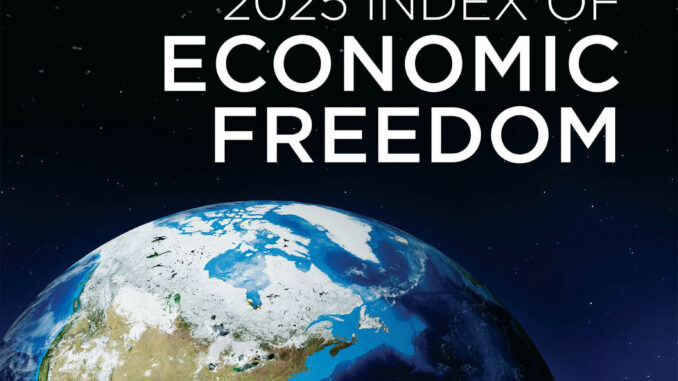
The American think tank Heritage Institute has released the 31st edition of its annual Index of Economic Freedom, which measures the impact of economic liberty and free markets worldwide. The 2025 index, which examines economic policies and conditions in 184 sovereign countries from July 2023 to June 2024, demonstrates a clear correlation between economic freedom and progress.
Across the African continent, where 52 countries were evaluated (Libya and Somalia were excluded from the study), Mauritius (75.0 points, 15th globally) leads the rankings as the only African nation in the “Mostly Free” category. Following behind are Botswana (69.9 points, 31st globally), Cape Verde (68.7 points, 40th globally), Seychelles (66.4 points, 52nd globally), São Tomé and Príncipe (60.4 points, 85th globally), and Morocco (60.3 points, 86th globally). These five countries are the only African nations classified as “Moderately Free.”
In North Africa, economic freedoms remain generally weak. Among the five countries in the region—Mauritania, Morocco, Algeria, Tunisia, and Egypt—only Morocco qualifies as “Moderately Free,” while two fall into the “Mostly Unfree” category (Egypt and Mauritania) and two are classified under “Repressed Economy” (Tunisia and Algeria).
Morocco achieved the best performance in North Africa with a score of 60.3 points, an improvement of 3.5 points compared to its 2023 score. The kingdom ranks 1st in North Africa, 6th in Africa, and 86th globally. Morocco’s strong showing is attributed to solid performances in investment freedom (75 points), financial freedom (75 points), monetary freedom (74.4 points), tax burden (71.4 points), business freedom (68.9 points), government spending (67.9 points), and trade freedom (67.2 points).
These results reflect the kingdom’s commitment to economic openness as its development model. While Morocco significantly exceeds average scores in 8 of the 12 indicators, the country still needs to make progress in labor freedom (48.5 points), fiscal health (46.2 points), government integrity (36.9 points), and judicial effectiveness (32.5 points).
Morocco stands as the only North African country to place in the global Top 100. Far behind follow Mauritania (54.9 points, 119th globally), Egypt (50.9 points, 145th globally), Tunisia (49.1 points, 149th globally), and finally Algeria, which ranks last in the region with a score of 47.5 points, placing it 160th worldwide out of 176 countries.
Globally, only three countries earned the designation of “economically free”: Singapore (84.1 points), Switzerland (83.7 points), and Ireland (83.1 points). At the opposite end of the spectrum, excluding countries not studied, the nations with virtually nonexistent economic freedoms are Sudan (35.3 points, 173rd globally), Zimbabwe (35.1 points, 173rd globally), Venezuela (27.6 points, 174th globally), Cuba (25.4 points, 175th globally), and North Korea (3.0 points, 176th globally).
The index evaluates countries based on 12 qualitative and quantitative indicators grouped into four main pillars: Rule of Law (property rights, government integrity, judicial effectiveness), Government Size (government spending, tax burden, fiscal health), Regulatory Efficiency (business freedom, labor freedom, monetary freedom), and Open Markets (trade freedom, investment freedom, financial freedom).
According to the latest findings, the global economy remains “largely unfree,” with the worldwide average score improving by just 1.1 points from the previous year to reach 59.7 out of 100.
However, “regardless of their current level of development, countries can measurably increase their economic growth and economic freedom by adopting policies that reduce taxes, streamline the regulatory environment, open the economy to greater competition, and fight corruption,” the Heritage Institute says.
